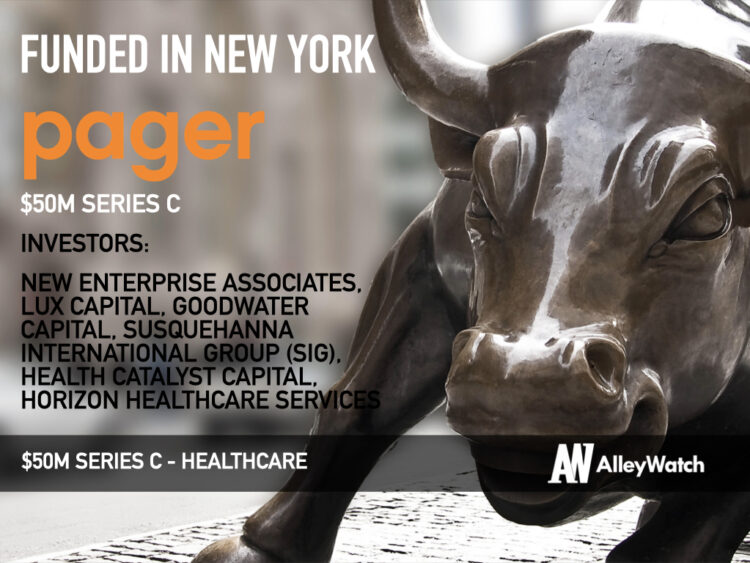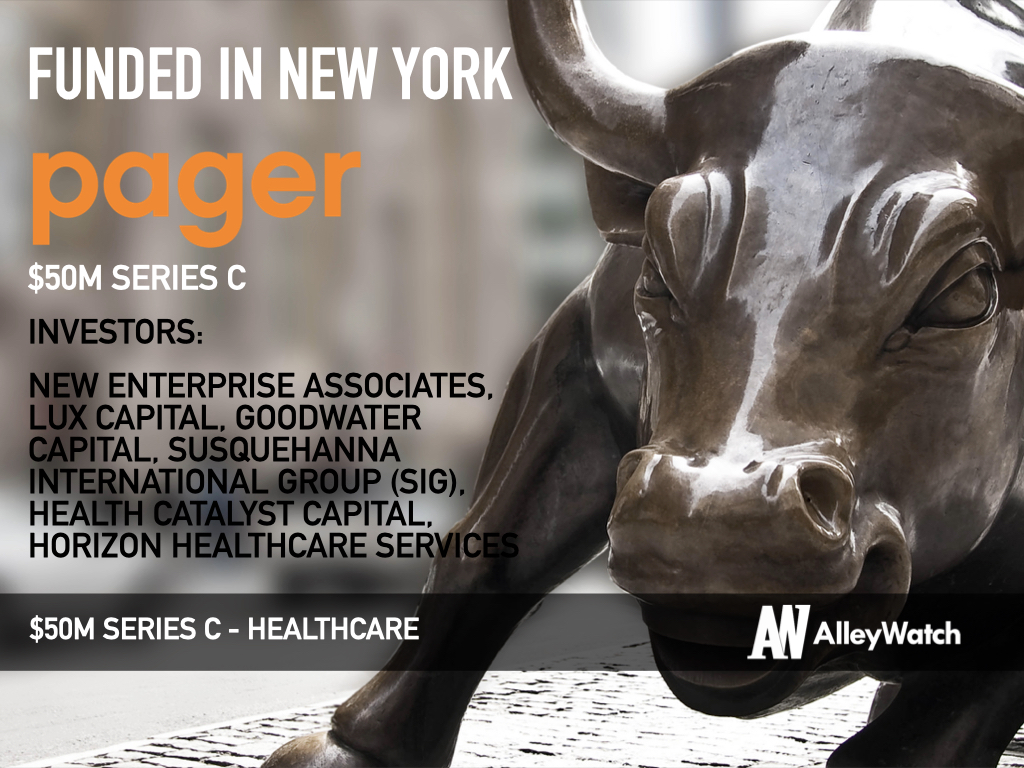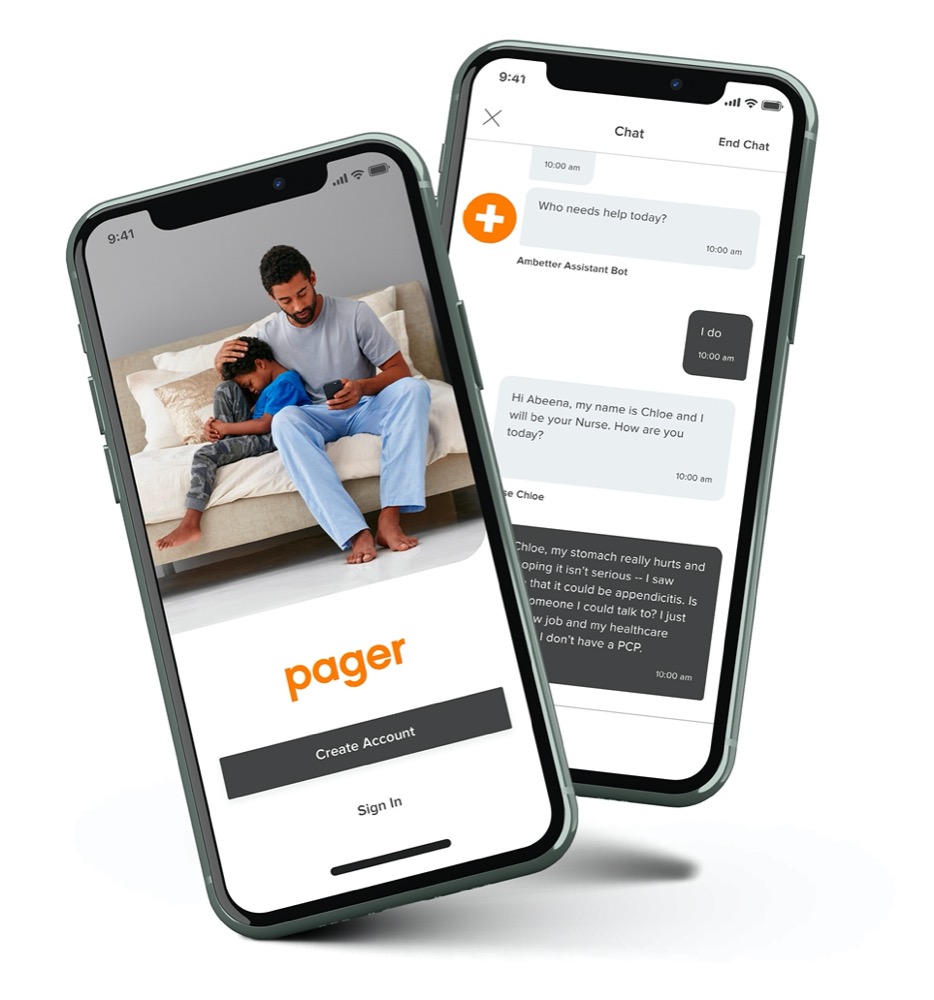The pandemic has defined the future of virtual healthcare as the importance of providing unfettered access to essential healthcare services grew dramatically as society adjusted to the new dynamic. The adoption is expected to endure. In fact, virtual care visits for outpatient care increased 38x in February of this year compared to February of 2020. Despite surging usage and an increased willingness from both consumers and providers, the virtual healthcare journey experience can still be quite fragmented. Pager is a comprehensive virtual care platform that helps patients from initial triage to follow-up care, all in a seamless experience. Offered primarily through health plans and health care organizations, the platform is always accessible to allow access to nurses, doctors, pharmacists, coordinators, and advocates while allowing users to manage nearly every facet of healthcare including triage, telemedicine, appointment scheduling, e-prescriptions, post-care follow-ups, care advocacy, billing, and customer service.
AlleyWatch caught up with Pager CFO Matthew J. Kempler to learn more about how Pager is allowing patients to navigate care pathways like never before, the company strategic plans, latest round of funding, which brings the total equity funding raised to $103.6M, and much, much more.
Who were your investors and how much did you raise?
Pager raised $70M as part of an equity and debt financing round. The Series C round was led by Susquehanna Private Equity Investments, an affiliate of Susquehanna International Group LLLP (SIG), and included other new and existing investors, including an affiliate of Horizon Healthcare Services, Inc., New Jersey’s largest health insurer. Debt financing was provided by Silicon Valley Bank.
Tell us about the product or service that Pager offers.
Pager’s virtual care navigation and collaboration platform, which is offered primarily through health plans, was developed to simplify and unify today’s complex and fragmented healthcare ecosystem. By combining high-tech AI automation and high-touch, human-centered services, our platform is available 24/7 to guide patients through their health concerns and needs across the entirety of their health journey. The platform offers triage, telemedicine, appointment scheduling, e-prescriptions, post-care follow-ups, care advocacy, customer service, and more. Our platform also offers a full care team of nurses, doctors, pharmacists, coordinators, advocates, and other patient-supportive roles, enabling customers to provide scalable, streamlined, and convenient care.
 What inspired the start of Pager?
What inspired the start of Pager?
Pager was created to transform the way that consumers interact with their healthcare. Oscar Salazar, an Uber cofounder, initially created Pager as an “Uber for doctors,” where patients could easily see a doctor in their home. Walter Jin, the current CEO of Pager, started as an angel investor in the company before eventually becoming Chairman.
Walter believed there was an opportunity to build on this consumer-first vision by making healthcare more accessible to all consumers. He recognized how fortunate he was to have a brother who is a Doctor, who he could always turn to for medical advice, and wanted to bring that “doctor in the family” experience to everyone. As a result of his previous work in healthcare, Walter understood the need to implement a simplistic and streamlined solution that could drive better outcomes and reduce costs by helping consumers better navigate the complexity of the healthcare system.
Pager launched its current enterprise solution in 2017, leveraging our existing technology, services, and guiding UX roots and expanding to partnerships with healthcare insurers and beyond.
This brings us to where we are today: an enterprise virtual care navigation and collaboration platform that guides patients through their healthcare journey to access the right care and support.
How is Pager different?
Within the healthcare space, there are currently more than 50,000 apps available to consumers. The majority of these apps are transactional point solutions that aim to address individual health concerns and episodic needs. Pager reduces healthcare fragmentation by delivering a variety of care services within a single consumer interface and guiding patients through the entire healthcare journey. As a result, Pager reduces costs for organizations, improves the consumer experience, and supports individuals in making better decisions for their health.
Our platform uses artificial intelligence and machine learning to augment high-touch services and deliver whole-person care, which sets the platform apart from single-service solutions that focus on one element of treatment, such as appointment scheduling or diagnostics. We partner with health plans, care providers, and employers to provide a virtual care platform that connects patients with comprehensive services, data, and a full care team to help them navigate not only their health concerns but also questions about their health plan and benefits. The platform can ultimately help direct patients to the right form of care, reducing unnecessary in-person visits to emergency departments or urgent care centers and speeding up the care journey.
What market does Pager target and how big is it?
Our platform can benefit health plans, health systems, and employers across the U.S., Latin America, and other international markets. This is a large and highly fragmented market opportunity. There are over one billion healthcare-related searches on Google each day, and an estimated $760-$935 billion of wasted spending in healthcare each year. This is a giant problem we are helping to solve.
There are over one billion healthcare-related searches on Google each day, and an estimated $760-$935 billion of wasted spending in healthcare each year.
What’s your business model?
Our platform is provided in the cloud through a subscription offering which, depending on each customer’s use cases, can include a combination of fixed-and usage-based pricing. We align pricing with the value we deliver, providing customers a strong ROI through an improved customer experience, lower cost to serve, and better outcomes.
What are your post-COVID office plans?
Even before the COVID-19 pandemic, we have had employees working remotely around the world in 10+ countries. This structure made it possible for our team to transition fairly seamlessly to remote work life during the pandemic. As Pager is headquartered in New York City, we hope to offer employees in the area the option to return to the office when it is safe to do so, and we are continuing to evaluate the working model that is best for our team.
What was the funding process like?
The process overall went very smoothly and proceeded faster than we expected. The necessity for virtual care and collaboration, and the insufficiency of existing solutions, became even more pronounced during the pandemic. Pager, with its 15 million contracted members, and a unique high-tech, high-touch offering, really stood out as one of the best positioned to address the fragmented healthcare industry’s challenges. As a result, we exceeded our initial fundraising expectations, closing out the process quickly, and bringing on board an impressive roster of high-quality growth and strategic investors.
What are the biggest challenges that you faced while raising capital?
We did this raise almost entirely virtually. While that is increasingly becoming the norm now, it was the first time we’ve raised capital primarily in a virtual setting. Establishing trust and building new relationships virtually required an even greater focus on communication, responsiveness, and transparency.
What factors about your business led your investors to write the check?
We’ve seen three primary factors stand out to investors. First is the depth and expertise of Pager’s leadership and advisory team. The team has deep domain expertise in healthcare and SaaS technologies, with proven operational experience and a strong network across the industry.
Second, we have the right platform, in the right place, at the right time. Digital adoption within the healthcare realm has become increasingly pertinent to the future of the healthcare industry – and this was further exemplified during the COVID-19 pandemic. Pager’s ability to efficiently connect patients with appropriate, quality, low-cost care and support by leveraging high-tech AI automation with high-touch, human-centered services draws investors to Pager.
Third, the platform is proven. Our mission-critical services are already deployed to millions of people. We are generating best-in-class 80+ net promoter scores and delivering actuarially certified savings of $190 per clinical encounter.
What are the milestones you plan to achieve in the next six months?
In the next six months, our team plans to leverage this new capital to scale capacity to meet record pipeline demand, accelerate innovation of Pager’s platform, and support the geographic expansion to new markets in the United States, Latin America, and worldwide.
What advice can you offer companies in New York that do not have a fresh injection of capital in the bank?
Leverage your networks, as the fundraising world is evolving rapidly and there is a multitude of new traditional and non-traditional capital sources seeking compelling startup and growth investments in NY. While on the hunt, refine your pitch, model, and target metrics, and double down on streamlining operations so that you maximize spend on the key growth drivers.
Leverage your networks, as the fundraising world is evolving rapidly and there is a multitude of new traditional and non-traditional capital sources seeking compelling startup and growth investments in NY. While on the hunt, refine your pitch, model, and target metrics, and double down on streamlining operations so that you maximize spend on the key growth drivers.
Where do you see the company going now over the near term?
On the heels of this funding round, we look to further advance and extend our services across the U.S., Latin America, and internationally, as well as scale capacity to support our growth as we continue toward our goal of improving healthcare access and navigation for 100 million lives. This includes enhancing Pager 360, our collaboration and communication platform for care teams, including physicians, nurses, specialists, advocates, customer service representatives, and a number of other roles to support patients. Pager 360, as well as Pager’s other solutions, are available through health plans, healthcare providers, and employers.
What’s your favorite outdoor dining restaurant in NYC?
I’m sad to say I’ve been bunkered up in Westchester for most of the pandemic, so I’ve been missing out on the NYC outdoor dining scene. In Westchester, my favorite spot for outdoor dining is Red Hat on the River in Irvington. It offers great food and amazing views of the Hudson.






